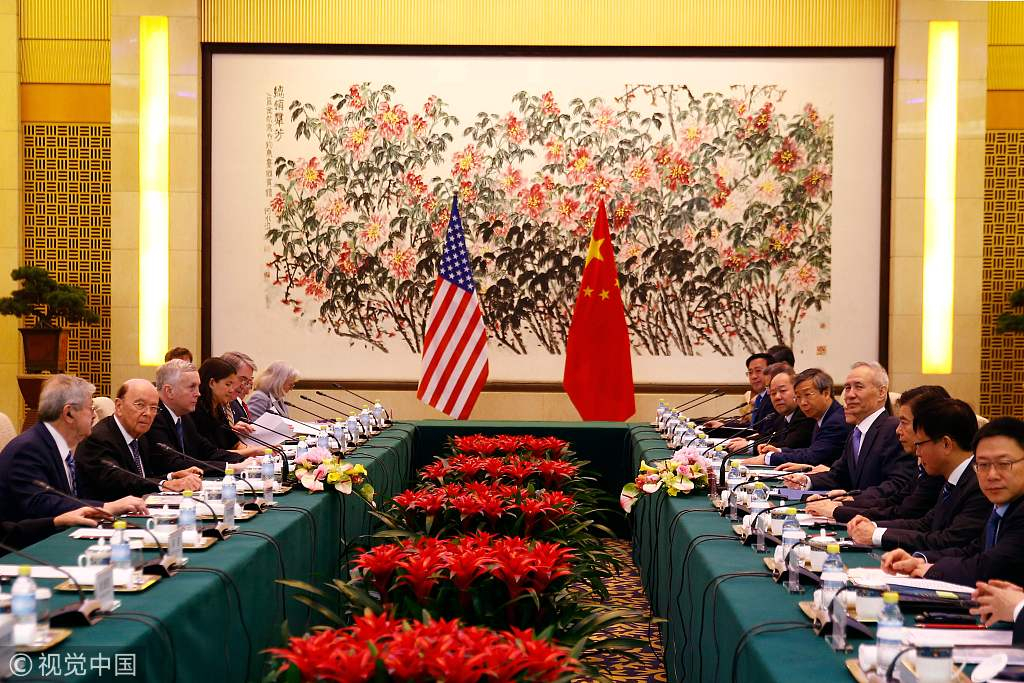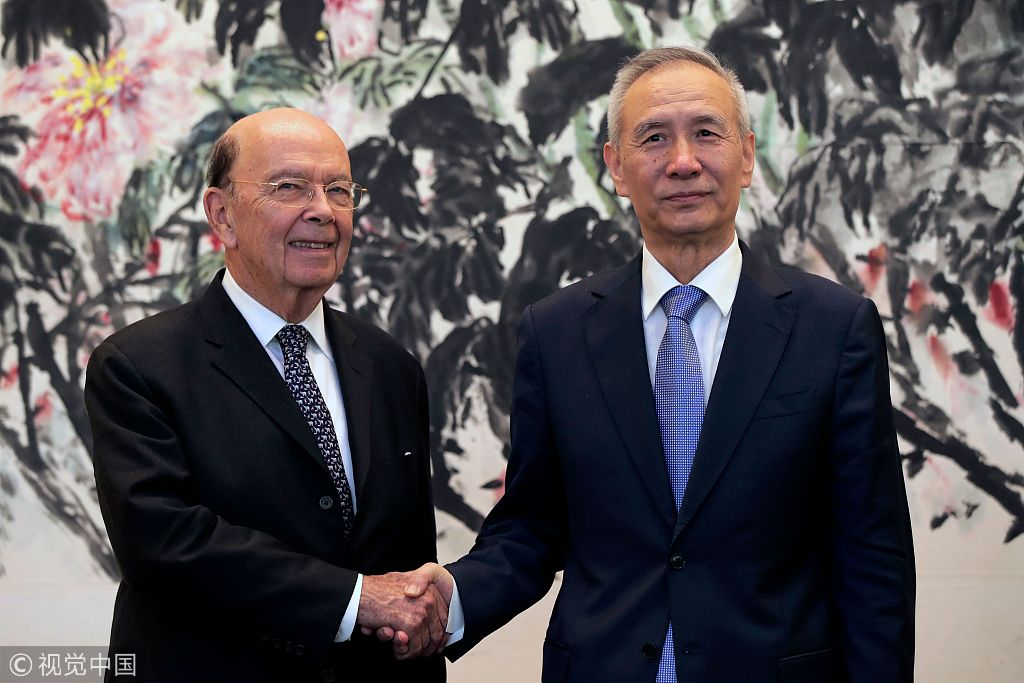
Opinion
08:31, 02-Feb-2019
Three metrics to measure the progress of China-U.S. trade talks

Editor's note: The article first appeared in Economic Daily on February 1, 2019. It reflects the author's view, and not necessarily those of CGTN.
From January 30 to 31, the China-U.S. high-level trade talks were held in Washington, DC. In the past two days, China and the United States have made important progress under the guidance of the important consensus reached at the meeting between the heads of state of the two countries in Argentina. The two sides have set out the timetable and road map for further negotiations.
Over the past 10 months, China-U.S. trade friction has gone through ebbs and flows. Currently, the negotiation teams of China and the United States have made important progress through sincere, detail-oriented and constructive discussions, making many people at home and abroad thrilled about the possible end of the dispute.
However, it should be noted that there are still some doubts about whether China will commit itself to responding to the U.S. concerns during the negotiations. People who hold such views fail to see China's firm stance to safeguard its core interests throughout the process and fail to realize that China's strategy of opening wider to the outside world will not change due to changes in external environment.
At the starting point of the new era in history, China will open up further to the outside world rather than go back on its opening-up strategy.

U.S. Commerce Secretary Wilbur Ross (2nd L) and Chinese Vice Premier Liu He (4th R) attend a meeting at Diaoyutai State Guesthouse in Beijin, June 3, 2018. /VCG Photo
U.S. Commerce Secretary Wilbur Ross (2nd L) and Chinese Vice Premier Liu He (4th R) attend a meeting at Diaoyutai State Guesthouse in Beijin, June 3, 2018. /VCG Photo
As for the ongoing China-U.S. trade talks, while firmly safeguarding China's core interests, we should regard it as an opportunity to promote reform and high-quality development through further opening up. We need to make good use of this opportunity to promote reform and opening up, especially to face up to crises, properly handle risks and grasp opportunities at times featured by the juxtaposition of opportunities and challenges.
This requires us not only to firmly safeguard national core interests, but also to use three metrics to measure the progress of China-U.S. trade talks and consciously make most of the opportunities behind all crises to strengthen ourselves.
The first metric is whether the latest progress can meet the people's growing needs for a better life. The report of the 19th National Congress of the Communist Party of China clearly put forward the important proposition that “the principal contradiction in our country has evolved into the contradiction between unbalanced and inadequate development and the people's ever-growing needs for a better life.”
China is willing to expand imports to meet the needs of its domestic market and its people, including significantly more imports of agricultural products, energy products, industrial finished goods and service products from the United States. This is conducive to meeting the needs of China's high-quality economic development and people's pursuit of a better life. This policy is focused on and pivoted to solving the principal contradiction in China.
The second metric is whether it can promote the high-quality development of the Chinese economy. The formulation and implementation of any policy is for the purpose of promoting China's high-quality economic development. The fact is that China's fast economic development in the past 40 years has been achieved under the conditions of opening up. In the future, China's high-quality economic development can only be achieved through further opening up.

U.S. Commerce Secretary Wilbur Ross (L) shakes hands with Chinese Vice Premier Liu He after their meeting at Diaoyutai State Guesthouse, June 3, 2018. /VCG Photo
U.S. Commerce Secretary Wilbur Ross (L) shakes hands with Chinese Vice Premier Liu He after their meeting at Diaoyutai State Guesthouse, June 3, 2018. /VCG Photo
Only by promoting reform through opening up and pushing for the shift from the opening up characterized by the free flow of goods and production factors to one characterized by alignment of rules and institutions with the world can China's economy truly go from “big” to “strong.”
The third metric is whether it is in line with the development philosophy of mutually beneficial cooperation. Since 2017, the world economy has gradually entered a stage of profound change after the global financial crisis. Protectionism has been on the rise. Economic globalization has encountered twists and turns, posing a direct threat to the world economic growth. In response, China has been advocating for the development philosophy of mutually beneficial cooperation to solve this problem.
This not only fully reflects China's commitment and responsibility as a major power in promoting globalization, but also is an innovative and well-targeted application of conventional Chinese wisdom in promoting the development of the contemporary world.
Taking the further opening up as an example, on the one hand, it meets the strong desire of the international community to expand their share in the Chinese market and ride on the fast development of China; on the other hand, it meets China's strong demand for high-quality and distinctive goods and services against the background of accelerated economic restructuring. It best embodies the development philosophy of mutually beneficial cooperation. Only mutually beneficial cooperation can bring about a bright future.
For China, while using these metrics to measure the progress of China-U.S. trade talks, it must focus on achieving its preset goals, which means China must pace itself in the process of the talks. No matter what the outcome of the negotiation is, as long as we hold onto our strategy, seize good opportunities and make great efforts to resolve prominent contradictions and problems, China's economy will surely have a brighter future.
In short, it is not easy for China-U.S. trade talks to make positive progress. The two sides should grasp the important opportunities at the moment, implement the important consensus reached by the two heads of state, cherish the positive progress that has been made, and strive to achieve more positive results so as to bring bilateral economic and trade relations back to the normal track as soon as possible.
(If you want to contribute and have specific expertise, please contact us at opinions@cgtn.com.)

SITEMAP
Copyright © 2018 CGTN. Beijing ICP prepared NO.16065310-3
Copyright © 2018 CGTN. Beijing ICP prepared NO.16065310-3